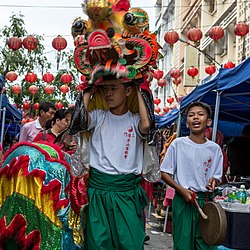
Back Hakka (volk) Afrikaans Ngayngay AMI هاكا (عرقية) Arabic Hakka AST Hakka Catalan Káh-gă CDO Hakka German Hakka Spanish Hakka etnia Basque مردم هاکا Persian
This article may require cleanup to meet Wikipedia's quality standards. The specific problem is: Significant unsourced material, often poorly organized and ungrammatical. (April 2024) |
 Hakka dancers performing traditional Qilin dance in Malaysia | |
| Total population | |
| 80 million[2] | |
| Regions with significant populations | |
| China, Taiwan, Southeast Asia, Europe, Americas | |
| Languages | |
| Religion | |
| Chinese folk religion, Confucianism, Taoism, Mahayana Buddhism, Christianity, Islam |
| Hakka people | |||||||||||||||||||||||||||||||||||
|---|---|---|---|---|---|---|---|---|---|---|---|---|---|---|---|---|---|---|---|---|---|---|---|---|---|---|---|---|---|---|---|---|---|---|---|
| Chinese name | |||||||||||||||||||||||||||||||||||
| Chinese | 客家 | ||||||||||||||||||||||||||||||||||
| Literal meaning | guest families | ||||||||||||||||||||||||||||||||||
| |||||||||||||||||||||||||||||||||||
| Vietnamese name | |||||||||||||||||||||||||||||||||||
| Vietnamese | người Khách Gia, người Hẹ | ||||||||||||||||||||||||||||||||||
The Hakka (Chinese: 客家), sometimes also referred to as Hakka Han,[1][3] or Hakka Chinese,[4] or Hakkas, are a Han Chinese subgroup whose ancestral homes are chiefly in the Hakka Chinese-speaking areas of Guangdong, Fujian, Jiangxi, Guangxi, Sichuan, Hunan, Zhejiang, Hainan, and Guizhou in China, as well as in Taoyuan City, Hsinchu County, Miaoli County, Pingtung County, and Kaohsiung City in Taiwan. Unlike other Han Chinese subgroups, the Hakkas are not named after a geographical region, e.g. a province, county or city, in China. That is because their origins were of northern Chinese refugees fleeing social unrest, upheaval and invasions throughout the northern parts of China (such as Gansu and Henan) throughout history who then sought sanctuary in the south where the Cantonese-speaking provinces such as Guangdong and Guangxi are. The Chinese characters for Hakka (客家) literally mean "guest families".[5] The word is Cantonese in origin and as the name implies, they are the guest of the Cantonese people. Over the centuries though, they have since more or less assimilated with the Cantonese-speaking population. Modern day Hakka are generally identified by both full Hakka and by different degrees of Hakka ancestry and usually speak Hakka Chinese.
The Hakkas are thought to have originated from the central plains.[6] Genetic studies have shown that the Hakka people are largely descended from North Han Chinese.[7] In a series of migrations, the Hakkas moved and settled in their present areas in South China and from there, substantial numbers migrated overseas to various countries throughout the world.[8] As the most diasporic among the Chinese community groups, the worldwide population of Hakkas (including in mainland China, Hong Kong, Macau, and Taiwan) is about 80 million to 120 million.[2] The Hakkas moved from Central China into Southern China at a time when the earlier Han Chinese settlers who already lived there had developed cultural identities and languages distinctive from Hakkas. The Tunbao and Chuanqing people are other Han Chinese subgroups that migrated from possibly somewhere in Central or Eastern China to Southwestern China while maintaining their ancestral traditions which differentiated them from the native Chinese people.
The Hakka people have had a significant influence on the course of modern Chinese and overseas Chinese history; in particular, they have been a source of many government and military leaders—in 1984, over half of the Standing Committee of the Chinese Communist Party Politburo were Hakka.[9]
The Hakka language is the most closely related to Gan and is sometimes classified as a variety of Gan, with a few northern Hakka varieties even being partially mutually intelligible with southern Gan. There are also some studies that consider Hakka people and Gan people have related genetics and shared areal features.[10] Today, Hakka is one of the official languages of Taiwan.[11] But like other official languages such as Hokkien and Formosan languages, they do not have the de facto special status of Taiwanese Mandarin.
- ^ a b Rubinstein, Murray A. (2004), "Rethinking Taiwanese and Chinese Identity: Melissa J. Brown's Is Taiwan Chinese?" (PDF), iir.nccu.edu.tw, vol. 40, Institute of International Relations, pp. 454–458, ISSN 1013-2511, OCLC 206031459, archived from the original (PDF) on 27 July 2011
- ^ a b "客家文化探密:怀念先人 感念生活 客家人闹元宵". news.sina.com.cn.
- ^ "Hakka culture GuangdongCulture". Newsgd.com. Retrieved 15 January 2015.
- ^ Yen, Ching-hwang (21 July 2008). The Chinese In Southeast Asia and Beyond: Socioeconomic and Political Dimensions. World Scientific. p. 379. ISBN 978-981-4471-99-2.
- ^ LaCroix, Frederick E. (2009). The sky rained heroes: A journey from war to remembrance. Austin: Synergy Books. p. 56. ISBN 978-0-9821601-3-8.
- ^ "The Hakka: The Jews of Asia". Edu.ocac.gov.tw. Retrieved 15 January 2015.
- ^ Li, Hui; Pan, Wu-Yun; Wen, Bo; Yang, Ning-Ning; Jin, Jian-Zhong; Jin, Li; Lu, Da-Ru (September 2003). "Origin of Hakka and Hakkanese: a genetics analysis". Acta Genetica Sinica. 30 (9): 873–880. PMID 14577381.
- ^ "Welcome to Longyan Municipal People's Government, PRC". English.longyan.gov.cn. Archived from the original on 6 April 2014. Retrieved 15 January 2015.
- ^ Erbaugh, Mary S. (December 1992). "The Secret History of the Hakkas: The Chinese Revolution as a Hakka Enterprise". The China Quarterly. 132 (132): 937–968. doi:10.1017/S0305741000045495. JSTOR 654189. S2CID 154584671.
- ^ Thurgood, Graham; LaPolla, Randy J., eds. (2003). The Sino-Tibetan Languages. Routledge. ISBN 0-7007-1129-5.
- ^ "Hakka made an official language". 30 December 2017.
© MMXXIII Rich X Search. We shall prevail. All rights reserved. Rich X Search